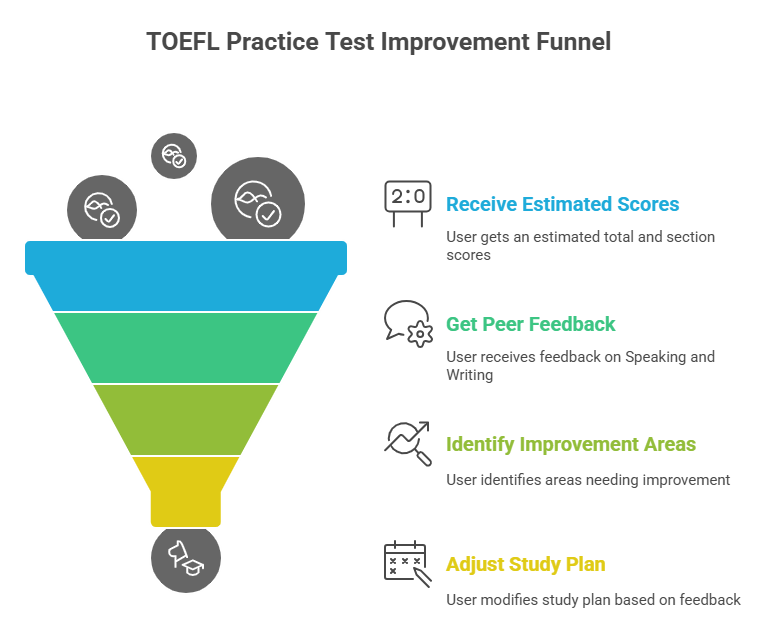Key Highlights of TOEFL Canada Practice Test
Here is a quick look at what you will get in this guide for your TOEFL Canada practice test:
- The TOEFL iBT test is the main test to show your English communication skills for Canadian universities.
- See where you can get free and official practice tests to help you get ready for test day.
- Learn about the new TOEFL Canada test format, with updates to the Reading and Listening sections.
- This guide gives you TOEFL sample questions for Canada for all four sections: Reading, Listening, Speaking, and Writing.
- Find good ways to use your practice test results to help you raise your final score.
- You will get answers to common questions about getting ready for the TOEFL iBT for your Canadian study plans.
Introduction
Are you an international student aiming to study in Canada? You must demonstrate your English proficiency, and the TOEFL test is widely accepted by Canadian institutions. Preparing for the TOEFL may feel overwhelming, but taking a TOEFL Canada practice test can ease your anxiety. This guide will assist you in achieving your desired score by explaining how the test functions.
You’ll learn about the format, see sample questions, and discover effective preparation strategies. Additionally, you’ll find innovative ways to enhance your English skills, thus improving your chances of success in Canada.
TOEFL Practice Tests for Canada: What You Need to Know
When preparing to apply to Canadian universities, the TOEFL iBT is often essential. A quality TOEFL Canada practice test helps you understand the real test format, time limits, and question types you’ll face on exam day. It’s crucial to familiarize yourself with the test structure, as the practice test assesses all four sections: Reading, Listening, Speaking, and Writing.
Additionally, it aids in developing the English language skills necessary for the exam. In the following sections, we will explore the unique features of the TOEFL Canada practice test and suggest some online resources for your preparation.
Online Test Options Tailored for Canadian Applicants
Are you wondering if you can prepare for the TOEFL test at home? Yes, you can. Online access makes it easy to get ready for the TOEFL iBT, no matter where you live in Canada. You do not need to be near a test center to find great resources. Many online platforms offer TOEFL practice tools you can use from home.
Many websites offer full-length TOEFL iBT mock tests right on your computer. When searching for online TOEFL practice, consider:
- Full-length tests that mirror the real exam (about 2 hours).
- Section-specific tests for focused practice.
- Access from anywhere with a good internet connection.
For extra help, visit TOEFL preparation courses at USCA Academy.
Key Features and Tools to Look For
Not all practice tests are the same. To get the most out of your study time, choose a TOEFL Canada practice test with strong features designed to help you improve. The best tools offer more than just questions they help you truly learn and track your progress.
Look for a provider with these useful features:
- Instant scoring: Get your score right away, often powered by AI, so you know where you stand.
- Detailed answer keys: Understand not only what you missed, but also why.
- Sample responses: Review model answers for Speaking and Writing to see what scorers expect.
TOEFL TestReady from ETS includes these features and provides personalized feedback.
Where to Find Official and Free TOEFL Practice Tests
Finding good practice materials is crucial for your TOEFL exam prep in 2026. Start with official resources from ETS, the organization that created the TOEFL. Their website offers a free TOEFL practice test featuring real past questions, simulating the actual test experience. Additionally, trusted test prep brands provide free mock exams that closely resemble the TOEFL iBT test, maintaining the same structure and difficulty level. Utilize these resources to enhance your preparation and improve your chances of success.
Trusted Canadian Websites Offering Mock Exams
Many websites can help you prepare for the TOEFL, but it’s best to use those trusted by students aiming for Canadian universities. These sites, such as Magoosh and Galvanize, offer practice tests and questions that closely match what Canadian schools expect. Their mock exams simulate the real TOEFL iBT experience with high-quality questions and authentic test layouts.
When you search for a TOEFL Canada practice test, look for:
- Full-length tests that match the timing of the actual test.
- Many different TOEFL sample questions for Canada.
- Content with topics similar to what you will find on test day.
- Detailed explanations for each reading passage and every question.
Using approved sources ensures you practice with up-to-date material and prepares you well for studying in Canada.
How to Access Instant Scoring and Feedback

One major advantage of online TOEFL practice tests is instant scoring and feedback, which helps you track your TOEFL Canada scores and identify areas for improvement before test day. Many platforms use AI-powered scoring similar to the real TOEFL iBT to check your answers. After completing a practice test, you typically receive:
- An estimated total score and separate section scores.
- Peer feedback on your Speaking and Writing, including comments on grammar, pronunciation, and structure.
Official tools like TOEFL TestReady and other top services offer these insights, so you can adjust your study plan and improve key skills before the exam.
Reading Section Practice Samples
The TOEFL Reading part checks if you can understand academic writing. You will get two texts to read. Each text is about 700 words. After each one, there are 10 questions. The question types are made to test your understanding. You need to find the main idea, know vocabulary, and more.
To do well, get to know all these question types. Here are some TOEFL sample questions for Canada you may see in the Reading part. This will help you get ready and know what to expect.
Question 1: What is the main idea of the passage?
The main idea question asks you to identify the overall message or theme of the passage, not just a specific detail. Read the first and last sentences of each paragraph. Avoid answers focused on minor details or ones that overgeneralize. Choose the option that best summarizes the passage’s main point.
Question 2: Which detail supports the author’s argument that solar energy is cost-effective?
This question asks you to find specific evidence in the text that shows solar energy is cost-effective. Look for keywords like “cost,” “price,” or “savings.” The correct answer will be a fact from the passage, such as lower solar panel costs or savings compared to fossil fuels.
Question 3: What does the word “mitigate” mean in this context?
Vocabulary questions on the TOEFL require you to use context to find word meanings. For “mitigate,” it usually means to make something less harmful. Read the sentence with the word and those around it for clues. In the example, policies “mitigate pollution,” so the word means to reduce negative effects.
Question 4: What can be inferred about the impact of fossil fuels on the environment?
Inference questions require you to find ideas suggested by the reading passage, not directly stated. For example, if fossil fuels are linked to greenhouse gases and climate change, you can infer they are harmful. Base your answer only on the passage, not outside knowledge, and avoid guessing beyond what’s provided.
Question 5: What is the author’s purpose in writing this passage?
When answering this question, consider why the author wrote the passage: to inform, persuade, entertain, or compare ideas. Check the tone, structure, and language used. Look for clues showing if the author wants you to learn, change your mind, enjoy a story, or see differences between two things.
Listening Section Practice Samples
The Listening section checks how well you understand spoken English in a school setting. You will listen to talks between people and lectures. Then, you will answer questions on what you heard. This part is very important for Canadian universities, because they need to know you can keep up with lectures and join group talks on campus. Your english communication skills be tested here.
You will hear audio passages, like campus talks and school lectures. Let us look at some example questions to help you get ready for the listening section on your TOEFL Canada practice test.
Question 1: What is the main point of the lecture?
This question asks for the main idea of the lecture, similar to the Reading section. Listen for repeated words or big ideas, and take notes on the main theme. The speaker may mention it at the start or end. After listening, choose the answer that best summarizes the lecture’s main point.
Question 2: Which detail indicates that the experiment was successful?
This listening question asks you to identify a detail proving the experiment was successful. Listen for a result, fact, or statement showing the experiment worked. Take brief notes on outcomes or conclusions. For example, a speaker might mention “a 50% reduction in symptoms,” confirming the experiment’s success.
Question 3: What is the speaker’s attitude toward the new research method?
To answer attitude questions in the listening section, focus on both what the speaker says and how they say it. Listen for tone, word choice, and pronunciation. Positive feelings use words like “groundbreaking.” Uncertainty uses phrases like “it remains to be seen.” These clues reveal the speaker’s true attitude.
Question 4: How would you summarize the conversation between the student and professor?
Summary questions in the listening section test your ability to find key ideas in a conversation, often between a student and professor. You must identify the main reason for their talk, how it ends, and what advice or help was given. Focus on the main point and ignore small talk.
Question 5: What can be inferred from the dialogue about the professor’s grading style?
Inference questions in the listening section require you to pick up clues not stated directly. For example, if a professor praises creativity over grammar, it shows their grading style favors ideas. Listen for hints in conversations to infer preferences. Mastering this helps you understand unspoken expectations in academic settings.
Speaking Section Practice Samples
The Speaking part of the TOEFL iBT checks your English communication skills. There are four different tasks. You will need to say what you think about a topic you know well. You will also talk about what you understand from short reading and listening passages. This part shows if you can speak clearly and with order in a school or college setting.
To get ready for this, you should work with many types of question types. The examples below show what you will face and how you can answer in the best way to get a high score. It will help you use your English listening and speaking in the test.
Question 1: Describe your opinion on online learning and explain why.
This task asks you to share your opinion on online learning. Clearly state if you think it is good or not, and give two or three reasons, like flexibility or easy access. Give examples from your life. Speak clearly, organize your ideas, and use good English for a high score.
Question 2: Summarize the reading and listening passages and give your opinion.
This Integrated Speaking task combines reading and listening skills. First, read a short academic passage, then listen to a related lecture. Summarize the main ideas from both sources. If asked, share your opinion on the solution presented, explaining your reason clearly. Mixing facts shows strong communication skills.
Question 3: Do you agree or disagree with the statement: “Students should focus on one subject at a time”? Explain your reasoning.
This Independent Speaking task asks you to choose a side on the statement. Explain if you agree or disagree and give two or three reasons, such as gaining a broad education or preventing boredom. Support each reason briefly, use a personal example, and keep your answer clear and within the time limit.
Question 4: Compare and contrast the two viewpoints presented in the lecture.
This Integrated Speaking task asks you to compare two viewpoints from a lecture. Take notes in two columns for each viewpoint. Start by introducing the topic, then discuss each perspective. Use transition words like “however” or “similarly” to highlight differences and similarities and clearly organize your response.
Question 5: Summarize what the speaker said about renewable energy initiatives.
This Integrated Speaking task checks your ability to summarize an academic talk about renewable energy initiatives. Listen for the main ideas, such as types of renewable energy, their benefits, and challenges. Your response should clearly mention the main topic and briefly summarize key points like solar, wind, hydro, and related issues.
Writing Section Practice Samples
The TOEFL Writing section has two parts. These are the Integrated Writing task and the Writing for an Academic Discussion task. The writing questions here check if you can write clear and well-organized English. You also need to use correct grammar when you write in an academic way. The test looks at your english proficiency by seeing if you can sum up, explain, and bring together information.
The best way to get ready is to use sample responses and practice with different prompts. Let’s see what types of writing questions you will get in the TOEFL test.
Question 1: Summarize the points from the reading and lecture in your own words.
This task asks you to read a passage and listen to a lecture on the same topic. Summarize both, focusing on how the lecture disagrees with the reading. Compare each point from the reading to the lecture’s response. Use your own words and avoid giving personal opinions.
Question 2: Do you agree or disagree with the statement: “Universities should require internships for graduation”? Write an essay supporting your opinion.
This prompt asks for your opinion about required internships for graduation. Start by clearly stating your view, such as agreeing because internships provide practical skills. Support your opinion with reasons and examples, like gaining career experience and networking. The writing should be clear and help move the discussion forward.
Question 3: Identify a problem discussed in the passage and propose a solution.
This prompt tests your ability to identify problems and propose solutions. You may read about issues like campus parking shortages or high student stress. First, clearly explain the problem from the passage. Then, suggest a logical solution, such as providing shuttle services or public transport rewards. Clarity and relevance matter.
Question 4: Discuss the cause and effect of deforestation as presented in the materials.
A cause-and-effect prompt asks you to explain why deforestation happens and what results from it, based on a reading or listening passage. Identify causes like farming or logging, then explain effects such as loss of biodiversity or soil erosion. Clearly link causes to effects, showing your understanding.
Question 5: Compare and contrast two ideas from the passage or lecture.
This prompt asks you to compare two ideas from a passage or lecture. Explain their similarities and differences, using details from the source. For example, compare city planning methods: more parks versus dense housing. Discuss what both achieve and how they differ, using linking words to organize your response.
Using Practice Tests Effectively
Just doing one TOEFL Canada practice test after another is not the best way to study. To really get better at your language skills and make your score go up, you need a plan. This means you should look at how you did on each test. Try to find your weak spots. You should put your time and work into the parts that matter the most.
Using tools such as TOEFL TestReady can help you see how ready you are. But the way you study has the biggest effect on how well you do. Let’s talk about how you can make your exam prep a great tool that helps you improve.
Self-Study Strategies for Maximum Improvement
A strong self-study plan for the TOEFL goes beyond simply taking practice tests. It’s essential to review your mistakes and focus on improvement. Staying organized helps you target your English skills effectively.
Here are some strategies for your routine:
- Simulate Test Conditions: Take full-length practice tests in a quiet, distraction-free space to get used to exam timing.
- Review Every Question: Check all answers, correct and incorrect, and understand why each was right or wrong. Use online explanations for clarity.
- Analyze Your Mistakes: Identify repeating errors, such as common grammar or question types.
- Create a Study Plan: Schedule extra practice for your weak areas.
Using these strategies will maximize your TOEFL practice test benefits.
Tracking Progress and Identifying Weak Areas
To make sure your TOEFL exam preparation for 2026 stays effective, consistently track your performance on practice tests. Monitoring your scores helps you see progress and highlights weak areas that need more focus. Create a simple log for each section to visualize your growth. After every practice test, review your results to identify which skills are improving and which ones require extra attention. For example, if your Reading score increases but your Speaking score remains the same, you know where to concentrate. Here is a sample tracking table:
| Practice Test Date | Reading Score | Listening Score | Speaking Score | Writing Score |
|---|---|---|---|---|
| October 1, 2024 | 22/30 | 21/30 | 19/30 | 20/30 |
| October 15, 2024 | 24/30 | 23/30 | 20/30 | 22/30 |
| November 1, 2024 | 25/30 | 24/30 | 22/30 | 23/30 |
Combining Practice Tests with Targeted Exercises
Practice tests show how you perform on the TOEFL iBT exam, but focused skill practice is also key. First, take a practice test to find your weak areas. Then, target those parts with section-only tests and drills. For example, if you struggle with Reading vocabulary, practice those questions. If Speaking is hard, work on summarizing and connecting ideas. Many websites, like TOEFL TestReady, offer practice for different sections.
Here’s how to combine both methods:
- Take a practice test for a starting score.
- Check your results and find weak points.
- Practice drills for weak sections.
- Take another test to measure progress.
Repeat this cycle until test day. For extra help, our expert tutors at USCA Academy can guide you step by step.
Conclusion
Getting ready for the TOEFL Canada test is not just about learning. The best way is to use practice tests every time you study. These practice tests help you to, know the format and the types of questions you will see. When you do this, you get better and increase your chances for a high score. If you make practice tests a regular part of your day, you can see where you need help and make small changes right away. Keep practicing and stay focused. This will help you do well. If you need help or have a question, reach out to us. It will help you be ready for your TOEFL test in Canada.
Frequently Asked Questions
1. Are TOEFL Canada practice tests different from regular TOEFL iBT tests?
No, there is no difference. The TOEFL Canada practice test has the same format as the standard TOEFL iBT. Canadian universities also accept this test. The content and structure match, and this english language test checks your english proficiency for university studies. It is made to test academic english for people who want to study in canada or other places.
2. Can I use unofficial practice tests to prepare for TOEFL Canada?
Using unofficial practice tests can help because they often show the types of questions and topics that you might see on the exam. But, you should check to be sure that the materials come from a good source so that you do not get wrong information. Try to mix these with official resources. This is the best way to get ready for the TOEFL Canada exam.
3. Can I practice TOEFL Canada online from anywhere in Canada?
Yes, you can do this. With online access, you get to take a full-length TOEFL iBT practice test from anywhere in Canada. It does not matter if you are close to test centers or if you live in a remote place. All you need is a computer and a good internet connection. This way, you can practice for test day and work on your English proficiency. The TOEFL test helps you get better at English for your goals.
4. Can taking practice tests improve my TOEFL speaking and writing scores?
Yes. Practice tests are very important if you want to get better at Speaking and Writing. They let you get used to the time you have and how the tasks are set up. For the best way to get ready for the exam, use tools that give you sample responses. Also, try to use AI tools that give feedback about your english communication and help you see how you can improve your english communication skills. This will help you make your answers better in the end.









